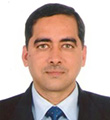2 December 2014
View Webinar Content
Presentation—Introduction to the webinar and panelists
Presentation—Elena Berger: Large‐scale Energy Efficiency in Indian Buildings: The Impact and Role of the Energy Conservation Building Code
Presentation—Meredydd Evans and Sha Yu: ECBC Implementation: Progress, Lessons Learned and Tools
Presentation—Jyotirmay Mathur: ECBC Impacts: Experiences from the ECBC Pilot Building in Rajasthan
Presentation—Bhaskar Deol: Implementing ECBC in Andhra Pradesh and Impacts on Real Estate Development
Transcript—Webinar audio transcript
The Clean Energy Solutions Center, in partnership with the U.S. Pacific Northwest National Laboratory (PNNL), is hosting a no-cost, webinar-based training on the implementation of the Energy Conservation Building Code (ECBC) in India.
India’s unprecedented construction boom has put tremendous pressure on building energy conservation. The Energy Conservation Building Code (ECBC), issued in 2007, can contribute to significant energy savings, pollution reductions, and expanded use of energy efficiency technologies in India. This webinar will review the progress with ECBC implementation in India and analyze the economic impacts of ECBC-compliant buildings.
The webinar features three presentations from leading scientists and building energy professionals. Topics discussed include the ongoing efforts to roll out ECBC implementation in Rajasthan and Andhra Pradesh, and results of the pilot building on the Malaviya National Institute of Technology Jaipur (MNIT)'s campus.
Panelists
 Elena Berger, Science and Technology Fellow, U.S. Department of Energy, Office of Energy Efficiency and Renewable Energy, International Program
Elena Berger, Science and Technology Fellow, U.S. Department of Energy, Office of Energy Efficiency and Renewable Energy, International Program
Dr. Elena Berger is a Science and Technology Fellow at the U.S. Department of Energy, Office of Energy Efficiency and Renewable Energy, International Program, currently managing the portfolio of projects in renewable and energy efficiency in collaboration with India. Dr. Berger is a chemical engineer with 13 years of experience in the chemical industry. She has a masters in international relations and a doctoral degree in public policy from the Georgia Institute of Technology, with a focus in energy and environmental policy. Before working at the Department of Energy, Dr. Berger has worked as a researcher and as consultant in the field of energy.
 Meredydd Evans, Senior Scientist, Pacific Northwest National Laboratory
Meredydd Evans, Senior Scientist, Pacific Northwest National Laboratory
Meredydd Evans is an energy policy and finance expert with over 20 years of international experience and has worked on energy efficiency and clean energy policies and projects in numerous countries. She is a senior staff scientist at the Pacific Northwest National Laboratory, where she is managing a program on international sustainable energy, including efforts on building energy efficiency codes and retrofits, energy data for policy and clean energy investments. She began working at PNNL in 1994, and she was seconded to the International Energy Agency in Paris from 2002-2006. While at the IEA, she served as Acting Head of the Non-Member Country Division and she wrote two books on energy policy. Both works have been used by national governments in designing policies, laws and regulatory systems. In addition, she has she led assessments of climate-related investments and policies, and developed energy efficiency and greenhouse mitigation projects worth over $100 million. Ms. Evans has a B.A. from Columbia University’s Barnard College and an M.A. from Harvard University. She is fluent in five languages and has published numerous books and articles.
 Sha Yu, Scientist, Pacific Northwest National Laboratory
Sha Yu, Scientist, Pacific Northwest National Laboratory
Sha Yu is a scientist at the Pacific Northwest National Laboratory. Her research focuses on developing and implementing energy efficiency and clean energy policies in developing countries such as India, China, Russia, and Vietnam. Building on her experience in building energy codes development and implementation, she is currently working with the State of Rajasthan to roll out the implementation of the Energy Conservation Building Code. She is also assessing future energy consumption of the Indian buildings sector and policy options, using the Global Change Assessment Model (GCAM). In addition, she has worked on the integrated assessment modeling in industrial, building, and transportation sectors; the modeling tool helps countries to analyze the impact of economic, demographic, and social development on energy supply and demand in the near and long terms. Sha Yu is also developing black carbon emissions inventory and mitigation measures in the Russian Arctic. Prior to joining PNNL, she worked on the environmental and social programs for the Beijing Olympic Games; she also worked on education and water projects in India focusing on social equity and development. Sha Yu received her Master’s degree in environmental and energy policy.
 Dr.-Ing. Jyotirmay Mathur, Head of Centre for Energy and Environment, Malaviya National Institute of Technology, Jaipur
Dr.-Ing. Jyotirmay Mathur, Head of Centre for Energy and Environment, Malaviya National Institute of Technology, Jaipur
Prof. Jyotirmay Mathur is a mechanical engineer, with postgraduate degrees in energy from the Indian Institute of Technology, New Delhi (India) and the University of Essen (Germany). He has authored over 50 research papers in refereed international journals, presented around 120 talks in international seminars/conferences, and published 5 books in energy. Dr. Mathur works extensively in building energy conservation, passive cooling systems, energy planning and modeling, building energy simulation, and development of codes and standards. He has been actively involved with the development and implementation of ECBC and the Green Building Movement in India since their conception, as a steering committee member, master trainer, and evaluator, among other capacities. As the Scientific Chair of the International Building Performance Simulation Association (IBPSA), Dr. Mathur is presently organizing the biannual conference, which will take place December 7-9, 2015 in Hyderabad (India).
 Bhaskar Deol, India representative, Natural Resources Defense Council
Bhaskar Deol, India representative, Natural Resources Defense Council
Bhaskar Deol is an India representative with NRDC’s India team and is based in New Delhi. Since 2011, Bhaskar has worked to advance NRDC’s clean energy and climate change projects with our partners in India. He is particularly focused on the India Initiative’s activities relating to renewable energy and building energy efficiency. He also works with NRDC team in India and globally to develop the business case for transitioning to climate friendly HFC alternatives for the air-conditioning industry. Prior to joining NRDC, Bhaskar worked as a sustainability consultant, where he helped develop sustainability strategies for businesses and local government in the United Kingdom. Bhaskar holds Bachelor and Master of Technology degrees in Chemical Engineering from the Indian Institute of Technology Madras and an MBA from INSEAD.
